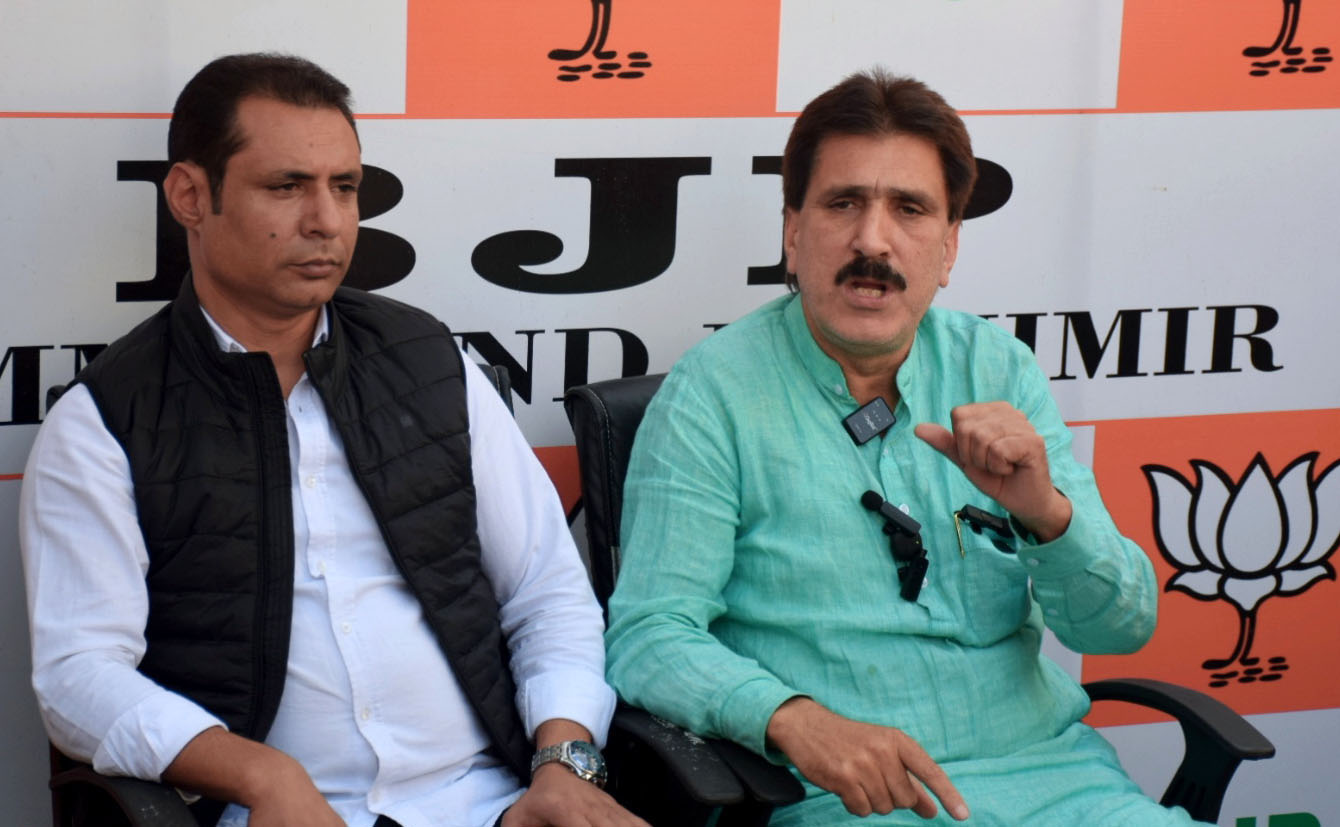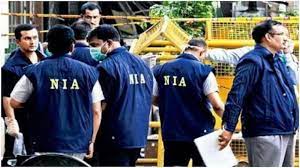One Year, Many Promises, Few Results — The NC–Congress Alliance Faces Rising Heat in Jammu & Kashmir
By: Javid Amin | 16 October 2025
As the Omar Abdullah-led National Conference (NC)–Congress alliance completes one year in power, the Bharatiya Janata Party (BJP) has mounted a fierce attack, accusing the government of “betraying the people of Jammu & Kashmir” through broken promises, symbolic politics, and lack of accountability.
Branding the current dispensation as “Ek saal nakami ki misaal” (a year symbolizing failure), the BJP’s criticism underscores growing political polarization — and signals that Jammu & Kashmir’s post-restoration political landscape is entering a new phase of confrontation.
BJP’s Allegations: A ‘Regime of Deception’
In a series of press conferences and public statements, BJP leaders unleashed a sharp critique of the NC-led coalition, accusing it of “governance through slogans, not substance.”
1️⃣ Broken Promises
BJP spokespersons outlined several key pledges from the 2024 NC election manifesto — “Dignity, Identity, and Development” — that they claim remain unfulfilled:
-
12 free LPG cylinders per year for below-poverty-line households.
-
10 kg of free monthly ration for families affected by job losses.
-
200 units of free electricity for rural and low-income urban residents.
-
Creation of 1 lakh jobs within six months of assuming office.
-
Youth innovation hubs and sports missions across all districts.
“Not one of these promises has materialized on the ground,” said BJP J&K spokesperson Altaf Thakur.
“Governance has turned into a theatre of lies. The public feels betrayed — emotionally, economically, and politically.”
The BJP further accused the government of “headline governance” — focusing on symbolic decisions like the revival of the Darbar Move — while neglecting core development and welfare priorities.
2️⃣ Transparency and Accountability
BJP National General Secretary Tarun Chugh demanded that the Omar-led administration publish an official performance report, outlining what has been achieved in its first year.
“People were promised dignity, but what they got was delay. The NC is hiding behind emotional issues while the common Kashmiri struggles with inflation and unemployment.”
— Tarun Chugh, BJP National General Secretary
He alleged that the Darbar Move revival was being used to “divert attention from economic stagnation and administrative inertia.”
Political Context: The Return of the Old Guard
The National Conference–Congress alliance, which returned to power in October 2024 after a decade in opposition, had campaigned on restoring identity and governance after the abrogation of Article 370.
The manifesto “Dignity, Identity, and Development” became a rallying cry, especially in the Valley, promising an era of responsive governance and welfare-oriented policy.
However, one year later, independent assessments and civil society audits paint a less optimistic picture.
A joint policy review by Kashmir InFocus and J&K Policy Watch revealed that of 12 major promises, only one — revival of the 69th National School Games — has been fulfilled in full, while 11 remain pending or abandoned.
Ground Report: The Manifesto vs. Reality
| Manifesto Promise (2024) | Status (2025) | Remarks |
|---|---|---|
| Restoration of Statehood | Pending | Central government not engaged in talks |
| 12 Free LPG Cylinders | Unfulfilled | No budget allocation |
| 10 kg Free Ration | Unfulfilled | PDS under financial strain |
| 200 Units Free Power | Partially Implemented | Pilot project in 2 districts only |
| 1 Lakh Jobs in 6 Months | Not Started | Recruitment process delayed |
| Youth Innovation Hubs | Concept Stage | No physical progress |
| Police Accountability Reform | Pending | File with Home Dept. |
| Domicile & Land Protections | Deferred | Requires legal consultation |
| Rural Healthcare Mission | Partial | Two new PHCs inaugurated |
| Sports & Games Revival | Implemented | 69th National School Games |
| Darbar Move Revival | Approved | Symbolic implementation |
| Skill-Linked Education Policy | Unfulfilled | Awaiting Cabinet nod |
This report has become a key talking point in BJP’s narrative, which frames the NC–Congress rule as a “continuation of the pre-2014 stagnation era.”
BJP’s Strategy: Framing the Narrative
1️⃣ Shifting the Battlefield
Unlike earlier elections that revolved around constitutional status or identity politics, the BJP is reframing the debate around delivery and governance.
“The NC promised a ‘Naya J&K’. What we got is the same old inefficiency, wrapped in nostalgia,” said Ravinder Raina, BJP J&K President.
By highlighting unemployment, rising electricity tariffs, and rationing delays, the BJP hopes to reconnect with the middle-class and working-class voter, particularly in Jammu, Udhampur, and Kupwara districts.
2️⃣ Positioning as the Voice of Accountability
Through a series of outreach programs — “Jan Vishwas Abhiyan 2025” — BJP cadres are touring rural and border areas to document public grievances and present them as “evidence of NC’s misgovernance.”
“We will not let them hide behind old symbols like Darbar Move or emotional slogans. Governance means jobs, transparency, and services — not rhetoric,”
said Priya Sethi, BJP’s Jammu unit leader.
Public Mood: From Hope to Disillusionment
In the first few months after NC’s victory, optimism was high. The restoration of civilian government after years of LG rule raised hopes of better local engagement.
However, by mid-2025, ground sentiment began to shift — particularly in North Kashmir, Chenab Valley, and Kathua — where infrastructure projects have stalled and unemployment remains widespread.
Voices from the Ground
“We were told jobs will come. But nothing has changed. The recruitment exams were postponed twice.”
— Imtiyaz Ahmed, graduate from Kupwara.
“Electricity bills are higher than ever. Even the 200-unit free power promise is just on paper.”
— Rukhsana Begum, homemaker from Anantnag.
“We voted for identity and dignity. But we see only silence and old slogans.”
— Ghulam Nabi, trader from Baramulla.
These testimonies mirror the erosion of confidence that the BJP is capitalizing on.
NC’s Response: ‘BJP Playing Politics of Negativity’
Facing increasing criticism, the National Conference leadership has hit back, calling the BJP’s campaign “selective, misleading, and hypocritical.”
NC spokesperson Tanvir Sadiq responded:
“The BJP has no moral right to question our record when their own administration left J&K jobless and voiceless for years. We inherited a hollow bureaucracy and a broken economy.”
The Chief Minister’s Office released a brief statement defending the government’s performance, citing:
-
Initiation of District Development Councils 2.0 reforms
-
Youth Employment Portal, launched in August 2025
-
Ongoing revival of cultural and tourism projects
-
Darbar Move restoration as a “symbol of administrative unity.”
Yet, analysts note that the NC’s rebuttals have lacked data-driven evidence — a gap the BJP continues to exploit.
Analysts’ Take: Symbolism vs. Substance
Political observers believe the BJP’s narrative has traction because the government’s visible deliverables remain limited.
Dr. Hilal Naqash, political scientist at Kashmir University, noted:
“In a post-Article 370 era, people are less swayed by emotional rhetoric. They expect governance, not grandstanding. BJP is tapping that shift effectively.”
Policy analyst Zoya Wani added:
“Omar Abdullah’s government banks heavily on symbolism — Darbar Move, heritage restoration — but the youth want jobs and digital governance. That mismatch creates vulnerability.”
Darbar Move: A Double-Edged Symbol
The revival of the historic Darbar Move — while emotionally resonant — has become a political flashpoint.
For NC, it’s a restoration of heritage; for BJP, it’s a wasteful ritual revived for optics.
“The people needed power relief, not a parade of files between Srinagar and Jammu,” quipped Tarun Chugh, drawing applause at a rally in Kathua.
This debate encapsulates the ideological contrast between NC’s traditionalism and BJP’s techno-administrative pragmatism — a fault line that will shape J&K’s evolving political grammar.
Historical Echoes: One Year That Feels Familiar
To many observers, Omar Abdullah’s current challenges echo his 2009–2014 tenure — marked by high expectations but low implementation.
Then, as now, bureaucratic inertia, internal coalition strains, and frequent political distractions undermined delivery.
The Congress partnership, while arithmetically necessary, often dilutes decisive policymaking — an issue that BJP tactically amplifies.
Economic Snapshot: Numbers Tell the Story
| Indicator | 2024 (Pre-NC Govt) | 2025 (After 1 Year) | Trend |
|---|---|---|---|
| Unemployment Rate | 18.7% | 19.3% | ↑ |
| Inflation (CPI) | 6.1% | 6.5% | ↑ |
| Rural Power Subsidy | ₹210 Cr | ₹175 Cr | ↓ |
| Job Creation (Govt + Pvt) | 42,000 | 21,800 | ↓ |
| Tourism Footfall | 1.6 Cr | 1.9 Cr | ↑ |
| Industrial Investment | ₹1,050 Cr | ₹1,120 Cr | ↔ |
| Road Connectivity (km added) | 180 km | 110 km | ↓ |
While tourism and limited investment show improvement, employment, power, and inflation metrics remain weak — reinforcing BJP’s attack line: “Symbolism won’t fill stomachs.”
BJP’s Emerging Playbook for 2026 Elections
1️⃣ Reclaiming Jammu’s Emotional Core
BJP aims to consolidate its traditional base in Jammu by linking NC’s “identity politics” to inefficiency, and positioning itself as the protector of economic stability.
2️⃣ Expanding Into North Kashmir
Through outreach in Kupwara, Bandipora, and Baramulla, BJP is engaging youth groups frustrated with the pace of government recruitment drives.
3️⃣ Coalition Counter-Narrative
By portraying NC–Congress as “dynastic politics 2.0,” BJP seeks to revive the anti-establishment sentiment that once powered its national rise.
Congress: The Silent Partner
Interestingly, the Congress, though part of the coalition, has maintained conspicuous silence amid the BJP’s offensive.
Some Congress leaders privately admit discomfort with NC’s centralized decision-making and slow delivery pace.
“We were promised coordination, not domination,” a senior Congress minister confided anonymously.
“The BJP is exploiting our silence.”
This intra-coalition friction may become a critical weakness if not addressed before the 2026 District Council elections.
Media and Civil Society Reaction
Editorials across regional outlets reflect a growing demand for accountability.
-
Rising Kashmir editorial: “One year later, the rhetoric of dignity must translate into the language of delivery.”
-
Daily Excelsior: “People expect more than symbolism — they need service.”
-
Kashmir Life: “Reviving traditions is easy. Reviving trust is harder.”
Civil society forums like the J&K Governance Collective have urged the government to publish quarterly progress reports, adopting a transparent “Report Card” approach.
The Road Ahead: Redemption or Regression?
As Omar Abdullah enters his second year in office, his government faces a pivotal choice:
-
Double down on symbolic restoration — continuing to emphasize heritage and emotional resonance, or
-
Shift decisively toward delivery-based governance, aligning with ground realities of youth unemployment, rural distress, and administrative fatigue.
Political strategist Arun Joshi summarizes the moment:
“The BJP is playing the long game. NC’s second year will decide whether it remains the narrator of nostalgia — or becomes the architect of renewal.”
Bottom-Line: Politics of Promises Meets the Politics of Performance
The BJP’s “Ek Saal Nakami Ki Misaal” campaign marks the beginning of J&K’s next political contest — one fought not over identity alone, but over credibility.
For the National Conference–Congress alliance, this is both a warning and an opportunity.
If it fails to show tangible progress in its second year, the BJP’s framing of “regime of deception” could solidify public opinion.
But if Omar Abdullah manages to deliver on jobs, services, and governance transparency, he could yet turn symbolism into substance — and reclaim the narrative of dignity through delivery.
Until then, the battle for the soul of Jammu & Kashmir politics remains open — between nostalgia and new-age pragmatism, between memory and measurable change.



